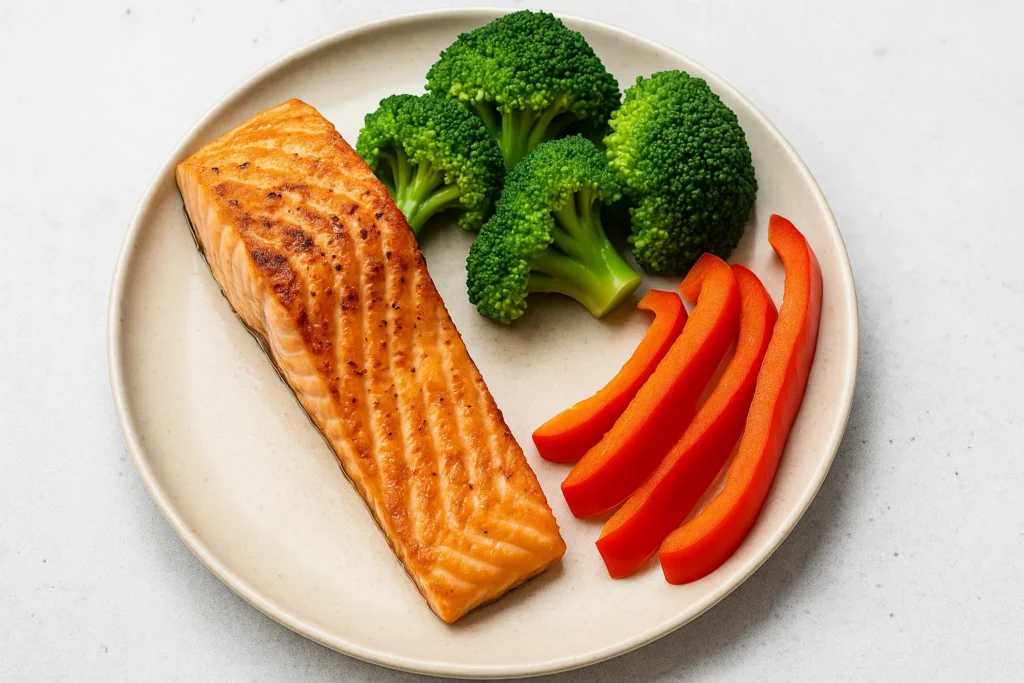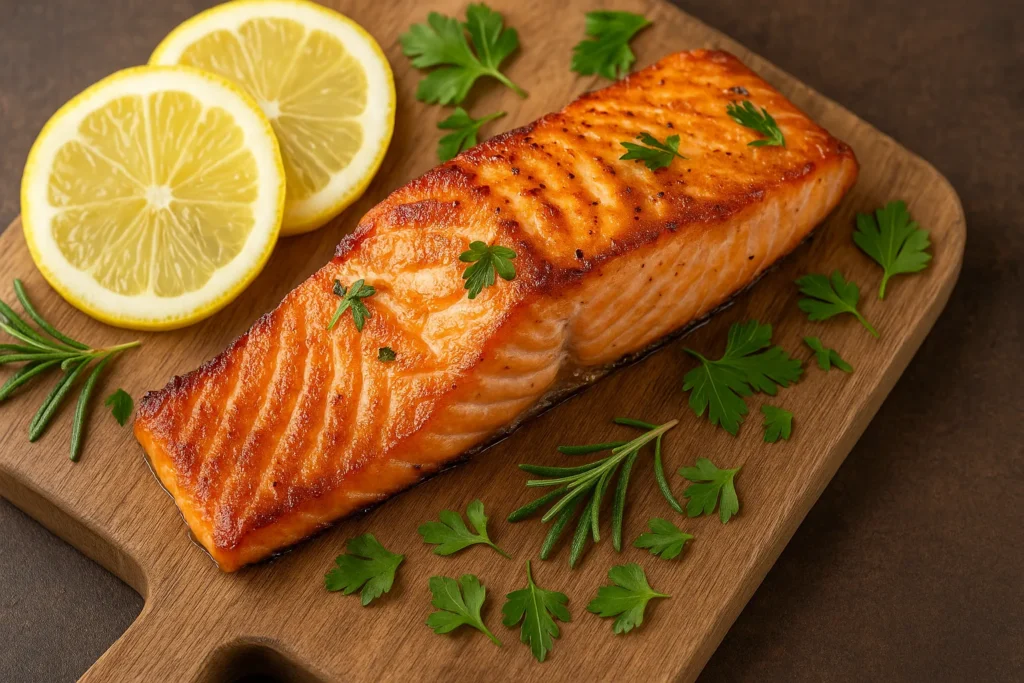Salmon nutrition facts, calories, and health benefits. Learn why salmon is rich in protein, omega-3s, and vitamins. Smart daily tips inside
Table of Contents
1. Introduction
Salmon is considered one of the world’s healthiest foods. Packed with omega-3 fatty acids, high-quality protein, and essential vitamins, salmon nutrition supports the heart, brain, muscles, and even your skin. Whether grilled, baked, or enjoyed raw in sushi, salmon is a nutrient-dense superfood that fits perfectly into a balanced lifestyle.
You can explore detailed nutrition data on Nutritionix.
2. Salmon Nutrition Facts
The nutrition profile of salmon depends on whether it is raw, cooked, wild, or farmed, but overall, it is rich in protein and healthy fats.
- Calories: ~200–230 kcal per 100 g cooked salmon
- Protein: 22–25 g
- Fat: 12–14 g (with omega-3s like EPA & DHA)
- Carbohydrates: 0 g (naturally carb-free)
- Cholesterol: ~55–60 mg
- Vitamins and Minerals: Excellent source of B vitamins, vitamin D, selenium, and potassium
For example:
- 3 oz (85 g) raw salmon = 177 kcal, 11 g fat, 17 g protein
- 4 oz (113 g) cooked salmon = 234 kcal, 25 g protein, 14 g fat
3. Key Health Benefits of Salmon
Better Circulation Support
Omega-3s in salmon help reduce bad cholesterol, lower triglycerides, and improve blood circulation. Eating salmon twice a week is linked to a healthier cardiovascular system.
Brain and Memory
Salmon provides DHA, a type of omega-3 essential for brain health. Regular consumption may boost memory, reduce cognitive decline, and lower the risk of dementia.
Strong Muscles and Protein Power
With 22–25 g of protein per serving, salmon supports muscle repair, growth, and recovery making it an ideal food for athletes and active lifestyles.
Weight Management
Protein and omega-3s work together to increase satiety and metabolism, helping with healthy weight control. Salmon is filling but not calorie-dense.
Healthy Skin and Eyes
The antioxidant astaxanthin, along with vitamin A and omega-3s, promotes younger-looking skin and sharper vision. It reduces oxidative stress and helps protect against eye disorders.
Mood and Mental Health
Studies suggest that omega-3s may reduce symptoms of depression and anxiety, while improving overall mood and mental balance.
Bone and Immunity
Salmon is one of the best natural sources of vitamin D, along with phosphorus and selenium, all of which support strong bones and a resilient immune system.
4. Salmon Nutrition info Table
| Nutrient (per 100 g cooked salmon) | Amount |
|---|---|
| Calories | 206 kcal |
| Protein | 22 g |
| Total Fat | 13 g |
| Omega-3 (EPA + DHA) | ~2.3 g |
| Carbohydrates | 0 g |
| Vitamin B12 | 80% DV |
| Vitamin D | 65% DV |
| Selenium | 75% DV |
| Potassium | 10% DV |
5. Salmon Types and Varieties
- Atlantic Salmon: Rich in fat, slightly higher in calories.
- Wild Salmon: Leaner, lower in calories, often with more minerals.
- Sockeye Salmon: Deep red color, strong flavor, ~133 kcal per 3 oz.
Each type offers different nutrition, but all are excellent choices.
6. How to Add Salmon to Your Daily Diet
- Grill or bake salmon with lemon and herbs.
- Add it to salads, pasta, or grain bowls.
- Try salmon sushi or smoked salmon on whole-grain bread.
- Recommended intake: 2 servings per week (about 100–150 g each).
7. Bitebene Tip
Pair salmon with vitamin C-rich foods like bell peppers or broccoli. Vitamin C enhances iron absorption, making your meal even more nutrient-powerful.

8. FAQ
How many calories are in salmon?
About 200–230 kcal, depending on cooking method.
Is salmon better raw or cooked?
Both are nutritious. Cooking may reduce some omega-3s but makes protein more digestible.
How often should you eat salmon?
Twice per week is recommended by nutrition experts.
Is wild salmon healthier than farmed?
Wild salmon is leaner with slightly fewer calories, while farmed salmon contains more fat and omega-3s.
Does salmon help with weight loss?
Yes. Its high protein and omega-3s help reduce hunger and support metabolism.
9. Related Articles on Bitebene
Read More: Watermelon Nutrition & BenefitsRead More: Benefits of Pineapple
10. Final Thoughts on Salmon Nutrition
Salmon is more than just a tasty fish it’s a nutritional powerhouse. From heart and brain support to strong muscles and glowing skin, salmon offers well-rounded benefits that make it one of the best foods for long-term health. Including salmon in your weekly routine is a smart, delicious step toward a healthier lifestyle.

